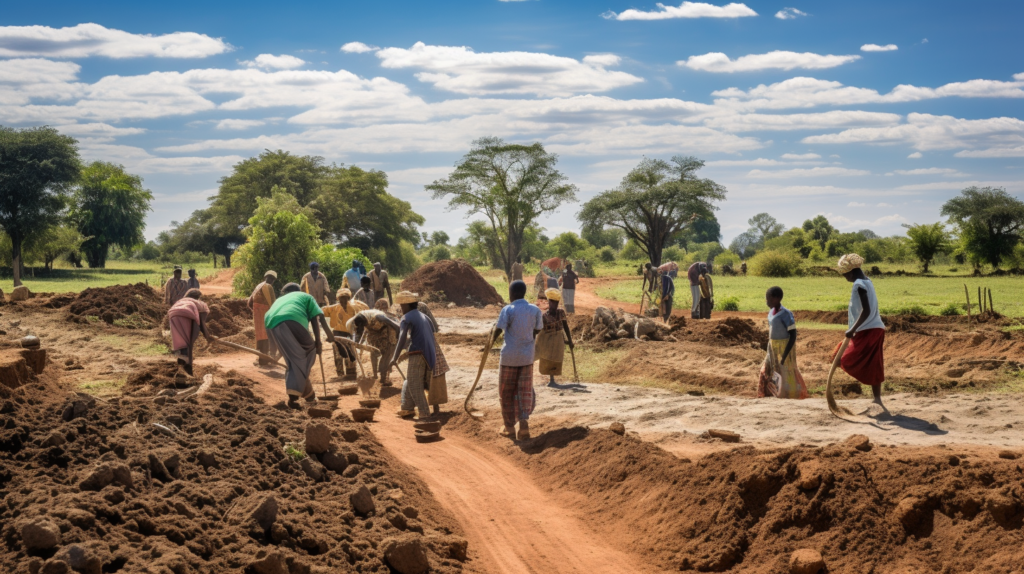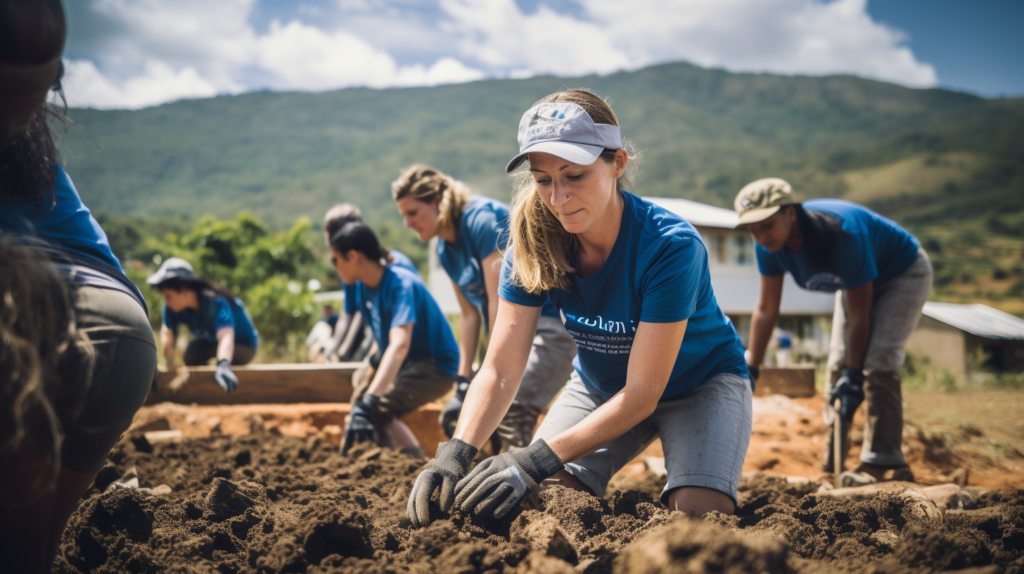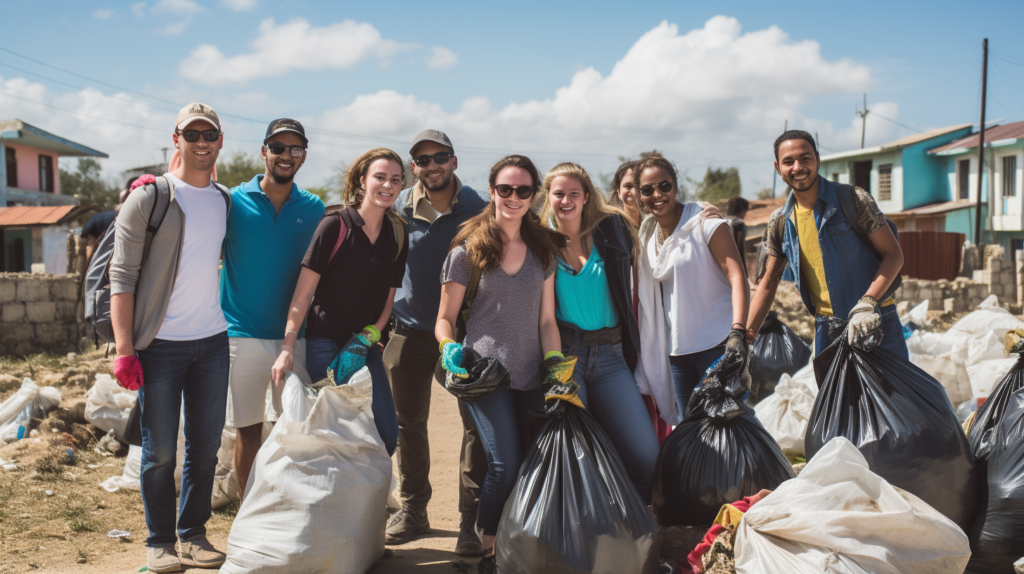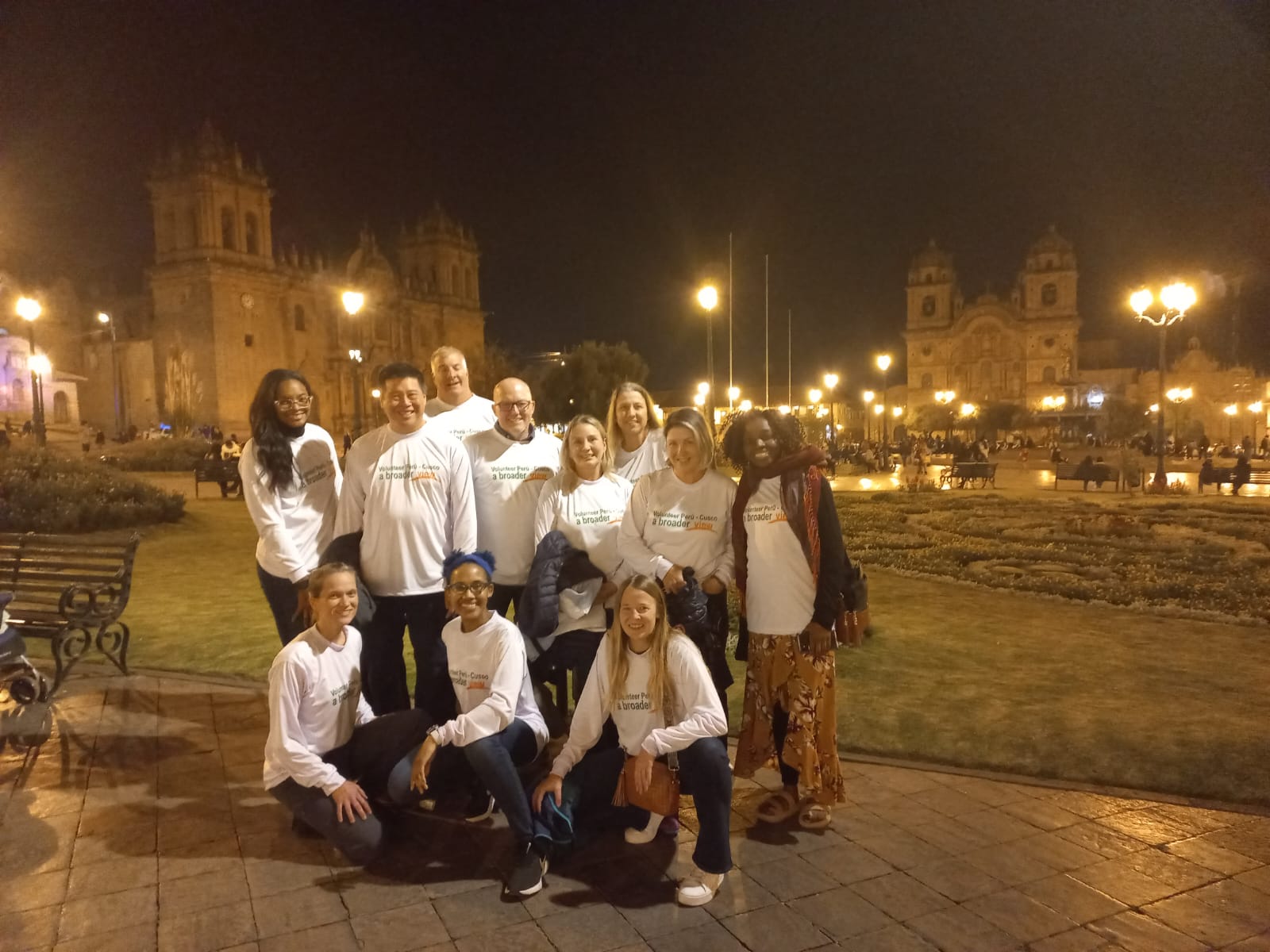Welcome to the world of eco-conscious volunteering! If you’re passionate about making a positive impact on the environment and communities around the world, you’re in the right place. Eco-conscious volunteering is a powerful way to contribute towards building a sustainable future while gaining a unique and fulfilling experience.
In this article, we will explore the concept of eco-conscious volunteering, the benefits it offers, and how you can choose the right project that aligns with your interests and skills. We will also delve into the importance of preparation and sustainable practices during your volunteering journey. Lastly, we will discuss the lasting impact of eco-conscious volunteering and the personal growth it can bring.

So, grab a cup of tea and let’s dive into the world of eco-conscious volunteering and discover how you can play a vital role in protecting our planet and making a difference in communities worldwide.
Understanding Eco-Conscious Volunteering
Eco-conscious volunteering is a type of volunteer work that focuses on environmental sustainability and conservation efforts. It goes beyond traditional volunteering by incorporating eco-friendly practices and initiatives into the volunteer experience. In this section, we will explore the concept of eco-conscious volunteering, the benefits it offers, and how ABV is committed to promoting sustainability.
The Concept of Eco-Conscious Volunteering
Eco-conscious volunteering is about making a positive impact on the environment while giving back to communities. It involves projects that directly contribute to conserving natural resources, protecting wildlife, and promoting sustainable practices. These projects can range from wildlife conservation initiatives to sustainable farming practices or even environmental education programs.
When participating in eco-conscious volunteering, you’ll have the opportunity to work alongside local communities, scientists, and conservationists who are dedicated to preserving the environment. By actively participating in these projects, you will contribute to the overall well-being of the ecosystems and communities you are working in.
Benefits of Eco-Conscious Volunteering
Engaging in eco-conscious volunteering offers numerous benefits, including:
- Hands-on learning: Eco-conscious volunteering provides a unique opportunity to learn about different ecosystems, wildlife, and sustainable practices firsthand. You’ll gain practical skills and knowledge that can be applied to your own life or future career aspirations.
- Cultural immersion: By volunteering abroad, you’ll have the chance to immerse yourself in local cultures and traditions. This cultural exchange adds richness to your experience, fostering a deeper understanding and appreciation of diverse people and places.
- Meaningful connections: Eco-conscious volunteering allows you to connect with like-minded individuals from all over the world who share a passion for environmental sustainability. These connections can lead to lifelong friendships and networking opportunities.
ABV’s Commitment to Sustainability
A Broader View (ABV) is dedicated to promoting sustainable practices and eco-conscious volunteering. ABV partners with local organizations and communities that have a strong commitment to protecting the environment. The projects they offer focus on sustainable agriculture, wildlife conservation, reforestation, and environmental education.
ABV ensures that volunteers are actively involved in projects that align with environmental needs and community priorities. They also provide guidance and support to volunteers, ensuring that sustainable practices are implemented throughout their volunteering experience. ABV’s commitment to sustainability extends beyond the volunteer projects, as they strive to minimize the environmental impact of their operations and accommodations.
In the next section, we will discuss how to choose the right eco-conscious volunteering project that aligns with your interests and skills.

Choosing the Right Eco-Conscious Volunteering Project
When it comes to eco-conscious volunteering, finding the right project that aligns with your interests and skills is crucial. Here are some tips to help you choose the ideal eco-conscious volunteering project:
Researching Different Project Options
Start by researching and exploring different eco-conscious volunteering projects. Look for projects that are focused on environmental conservation, sustainable development, or wildlife rehabilitation. Consider the specific goals and objectives of each project to ensure that they align with your own values and interests.
Considering Local Environmental Needs
Every community has different environmental needs. When choosing an eco-conscious volunteering project, it’s important to consider the specific environmental challenges faced by the local community. Whether it’s reforestation efforts, marine conservation, or sustainable agriculture, choose a project that addresses the most pressing environmental issues in the area.
Aligning Volunteer Skills and Interests
Take into account your own skills, interests, and strengths when selecting an eco-conscious volunteering project. Ask yourself what skills or expertise you can bring to the project. For example, if you have a background in environmental science, you may be interested in participating in research and data collection. If you have experience in community engagement, consider projects that involve working closely with local communities to promote sustainable practices.
By choosing an eco-conscious volunteering project that aligns with your skills and interests, you can make a more meaningful contribution and have a more fulfilling experience.
Example:
“I was passionate about marine conservation and wanted to find a project that focused on protecting coral reefs. After researching various options, I came across an eco-conscious volunteering project that aimed to restore damaged coral reefs in a coastal community. This was the perfect fit for me as I had a background in marine biology and was eager to apply my knowledge to make a difference.”
Remember, the goal is to find a project that not only supports your passion for the environment but also allows you to make a meaningful impact through your skills and expertise. Take your time in selecting the right eco-conscious volunteering project and embark on a journey that will have a positive and lasting effect on the environment.
Preparing for Eco-Conscious Volunteering
Preparing for eco-conscious volunteering is an important step that maximizes the positive impact you can make on the environment and local communities. Here are some key considerations and steps to take before embarking on your eco-conscious volunteering journey:
Gaining Knowledge about the Local Ecosystem
Before you start your eco-conscious volunteering project, it’s crucial to understand the local ecosystem and the environmental challenges it faces. This knowledge will help you identify the most effective ways to contribute and make a difference. Here’s what you can do:
- Research the local flora and fauna, as well as the unique ecosystems that exist in the region where you will be volunteering.
- Learn about the environmental issues, such as deforestation, habitat loss, or pollution, that are prevalent in the area.
- Understand the local cultural and social factors that contribute to environmental challenges.
Obtaining Necessary Permits and Documentation
Some eco-conscious volunteering projects may require permits or specific documentation to ensure compliance with local regulations and guidelines. To ensure a smooth and legal volunteering experience, follow these steps:
- Contact the volunteer organization or project coordinator to understand any legal requirements for volunteering in the specific location.
- Check if you need a visa or work permit, depending on the duration of your volunteering project and the country you will be visiting.
- Gather the necessary documents, such as your passport, medical records, and any certifications or qualifications that may be required for your project.
Packing Eco-Friendly and Sustainable Supplies
When you’re preparing for eco-conscious volunteering, it’s essential to pack in a way that aligns with sustainability principles. Here are some tips to pack eco-friendly and sustainable supplies:
- Use a reusable water bottle to reduce waste and plastic consumption.
- Pack energy-efficient and environmentally friendly equipment and tools, such as solar chargers or hand-powered devices.
- Carry eco-friendly toiletries, such as biodegradable soaps and shampoos, to minimize water pollution.
- Bring reusable bags and containers for shopping and storing food to avoid single-use plastics.

Remember, proper preparation not only ensures a smooth volunteering experience but also contributes to a more sustainable and eco-conscious approach to your project. By gaining knowledge about the local ecosystem, obtaining necessary permits, and packing sustainably, you will be well-equipped to make a positive impact during your volunteering journey.
“The greatest threat to our planet is the belief that someone else will save it.” – Robert Swan
Engaging in Sustainable Practices During Volunteering
When embarking on an eco-conscious volunteering project, it’s essential to engage in sustainable practices to ensure that you’re making a positive impact on the environment. By adopting sustainable habits and implementing environmentally friendly initiatives, you can contribute to conservation efforts, protect the local ecosystem, and promote long-term sustainability. Here are some key ways to engage in sustainable practices during your volunteering experience:
Supporting Conservation and Restoration Efforts
- Participate in activities that focus on conserving and restoring natural habitats, such as reforestation projects or marine conservation initiatives.
- Help in the preservation of endangered species by assisting in wildlife monitoring and protection programs.
- Contribute to sustainable agriculture practices by volunteering on organic farms or community gardens.
Implementing Sustainable Waste Management
- Minimize waste by reducing, reusing, and recycling materials.
- Follow proper waste disposal procedures and educate local communities on the importance of recycling and reducing waste.
- Consider composting organic waste to help create nutrient-rich soil and reduce greenhouse gas emissions.
Promoting Local Community Engagement
- Work closely with local communities to understand their needs and develop sustainable solutions.
- Support local economies by buying locally sourced products and services.
- Encourage eco-tourism initiatives that promote responsible travel and sustainable development.
By engaging in sustainable practices during your volunteering experience, not only are you helping to protect and preserve the environment, but you’re also setting an example for others to follow. Your efforts can inspire long-lasting change and encourage local communities to adopt sustainable practices in their daily lives.
“The only way forward, if we are going to improve the quality of the environment, is to get everybody involved.” – Richard Rogers
Making a Lasting Impact
When engaging in eco-conscious volunteering, one of the primary goals is to make a lasting impact on the environment and the local community. Here are some strategies and actions you can take to ensure that your efforts have a lasting positive effect:
Monitoring and Evaluating Project Success
Regularly monitoring and evaluating the success of your eco-conscious volunteering project is crucial. This allows you to assess the effectiveness of your actions and make any necessary adjustments. Here are some ways to monitor and evaluate project success:
- Measure and track key indicators: Establish measurable goals and track indicators related to conservation efforts, community engagement, and environmental impact. This could include things like the number of trees planted, the reduction in waste, or the increase in community awareness.
- Conduct regular assessments: Schedule regular assessments to evaluate the progress and effectiveness of the project. This can be done through surveys, interviews, and observations. Use the feedback obtained to identify areas for improvement and make any necessary changes.
- Collaborate with local stakeholders: Engage with local community members, organizations, and authorities to gain their insights and perspectives on the project’s impact. Their feedback can provide valuable insights into the long-term sustainability and effectiveness of the project.

Continued Support and Follow-up Actions
For your impact to be sustainable, it’s important to provide continued support and follow-up actions even after your volunteering period is over. This ensures that the work you started can be continued and built upon by others. Consider the following actions:
- Establish partnerships: Collaborate with local organizations, NGOs, or government entities that are committed to sustainability and environmental conservation. By establishing partnerships, you can ensure that there is ongoing support and resources allocated to the project.
- Empower and train local community members: Share your knowledge and skills with local community members. Provide training sessions on sustainable practices, conservation techniques, and environmental education. By empowering the local community, you enable them to continue the work beyond your volunteering period.
- Fundraising and resource mobilization: When you leave the project, consider organizing fundraising initiatives or connecting the project with potential donors or sponsors. This can help secure ongoing financial support and resources for the project.
Sharing Experiences and Inspiring Others
One of the most powerful ways to make a lasting impact is by sharing your experiences and inspiring others to get involved in eco-conscious volunteering. Here’s how you can do this:
- Document your journey: Throughout your volunteering experience, document your activities, challenges, and achievements through photos, videos, or blog posts. Share these on social media platforms, travel forums, or personal blogs. This helps raise awareness and inspire others to take action.
- Speak at events or conferences: If you have the opportunity, share your eco-conscious volunteering journey by speaking at events, conferences, or workshops. By sharing your first-hand experiences and insights, you can inspire others to make a difference and contribute to environmental sustainability.
- Engage with your community: Once you return home, engage with your local community by organizing awareness campaigns, eco-friendly events, or workshops. By sharing your experiences and knowledge, you can encourage others to adopt sustainable practices in their own lives.
Remember, making a lasting impact requires a collective effort. By monitoring and evaluating project success, providing continued support, and sharing your experiences, you can help create a ripple effect that spreads environmental consciousness and inspires others to take action.
Benefits of Eco-Conscious Volunteering
Eco-conscious volunteering is not just about making a positive impact on the environment; it also offers a range of benefits for the volunteers themselves. Engaging in eco-conscious volunteering can be a transformative experience that can have a lasting impact, both personally and professionally. Here are some of the key benefits of participating in eco-conscious volunteering:
Personal Growth and Development
Volunteering in eco-conscious projects provides a unique opportunity for personal growth and development. By stepping out of your comfort zone and immersing yourself in a new environment, you are challenged to learn and adapt. This can help you develop valuable skills such as problem-solving, leadership, and teamwork. Additionally, being exposed to different cultures and perspectives can broaden your worldview and enhance your intercultural competence.

Cultural Exchange and Immersion
One of the incredible benefits of eco-conscious volunteering is the chance to immerse yourself in a different culture. Working alongside local communities allows you to form meaningful connections and gain a deeper understanding of their way of life. This cultural exchange can promote mutual respect and appreciation, fostering global harmony and understanding.
Creating Global Environmental Awareness
By engaging in eco-conscious volunteering, you become an ambassador for global environmental awareness. As you participate in projects that focus on conservation and sustainability, you not only contribute to local efforts but also inspire others to take action. By sharing your experiences and raising awareness, you can play a crucial role in creating a more environmentally-conscious society.
“Eco-conscious volunteering not only benefits the environment but also offers a meaningful and transformative experience for the volunteers. It is an opportunity to grow personally, immerse oneself in different cultures, and contribute to global environmental awareness.”
Eco-conscious volunteering can have a profound impact not only on the environment but also on the volunteers themselves. It is a chance to grow, learn, and make a positive difference in the world.
So, if you’re looking for a meaningful way to give back to the planet while also gaining valuable experiences, consider participating in eco-conscious volunteering. Join organizations like ABV that are committed to sustainability and embark on a journey that will not only benefit the environment but also enrich your life in numerous ways.
Conclusion
Conclusion
In conclusion, eco-conscious volunteering is a powerful way to make a positive impact on the environment while also immersing oneself in different cultures and communities around the world. By choosing to volunteer with A Broader View, you can be assured of a meaningful and sustainable experience.
Through their commitment to sustainability and their extensive range of eco-conscious volunteering projects, A Broader View provides volunteers with the opportunity to contribute to local environmental initiatives and make a lasting difference. Whether you’re passionate about conservation, wildlife preservation, or sustainable agriculture, there is a project that aligns with your interests and skills.
By preparing yourself with the necessary knowledge, documentation, and eco-friendly supplies, you can ensure that your volunteering experience is as sustainable as possible. During your project, you can engage in sustainable practices such as supporting conservation efforts, implementing waste management strategies, and promoting community engagement.

The benefits of eco-conscious volunteering extend beyond the project itself. It offers personal growth and development, allowing you to learn new skills, gain a deeper understanding of the environment, and broaden your perspective on global issues. Additionally, it provides opportunities for cultural exchange and immersion, allowing you to connect with local communities, exchange ideas, and create lifelong memories.
By monitoring and evaluating project success, continued support, and sharing your experiences with others, you can make a lasting impact and inspire more people to become involved in sustainable volunteering. Together, we can build a sustainable future and create global environmental awareness.
So why wait? Start your eco-conscious volunteering journey with A Broader View today and be part of the solution for a better and greener world.
Visit www.abroaderview.org to explore their range of eco-conscious volunteering projects and make a difference that truly matters.
Frequently Asked Questions
- What is ABV?
ABV stands for A Broader View, which is a non-profit organization that specializes in connecting volunteers with meaningful and sustainable volunteering opportunities across the globe.
- How does ABV promote eco-conscious volunteering?
ABV promotes eco-conscious volunteering by offering projects that focus on environmental conservation, sustainable agriculture, wildlife preservation, and community development initiatives that promote eco-friendly practices.
- What types of eco-conscious volunteer projects does ABV offer?
ABV offers a variety of eco-conscious volunteer projects such as reforestation, organic farming, marine conservation, recycling initiatives, eco-tourism development, and renewable energy projects.
- How can I get involved in eco-conscious volunteering with ABV?
To get involved in eco-conscious volunteering with ABV, you can visit their website and browse through the available volunteer projects. Choose a project that aligns with your interests and apply online. ABV will guide you through the application process and provide all necessary information and support.
- Is previous volunteer experience required for joining ABV’s eco-conscious projects?
No, previous volunteer experience is not always required to join ABV’s eco-conscious projects. Many projects are designed for individuals with varying degrees of experience, including beginners. However, some specialized projects may require specific skills or qualifications.
-
Safe Solo Volunteering Abroad | Empowerment FemalesThrough Service with ABV

Embrace the adventure of a lifetime with ABV’s supported solo volunteering programs. Create lasting friendships, make a real difference, and explore the world safely under a supportive umbrella. Recommend Peru, Ecuador, Colombia, and more. Table of Contents Introduction to ABV and Solo Volunteering Traveling solo can be a thrilling yet daunting endeavor. A Broad View…
-
Empowerment Through Sustainable programs: Volunteer Opportunities in Peru Cusco

Discover empowering volunteer opportunities in Peru Cusco with www.abroaderview.org. Support sustainable programs and make a positive impact while gaining valuable experiences.
-
Midwives & Obstetricians: Empower Mothers & Babies Abroad

Discover how midwives and obstetricians from abroad can empower mothers and babies through the programs offered by www.abroaderview.org. Make a difference today.



